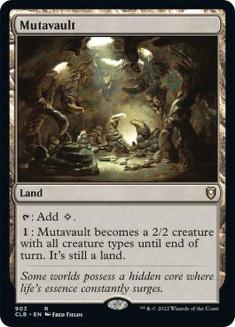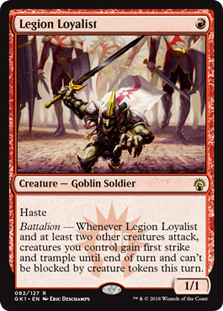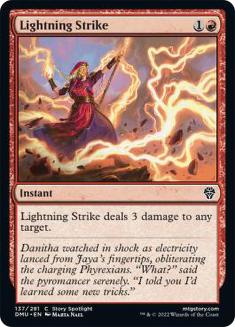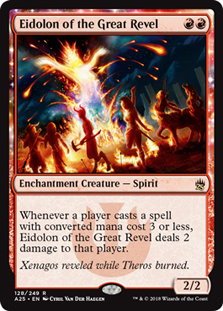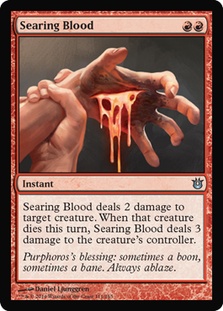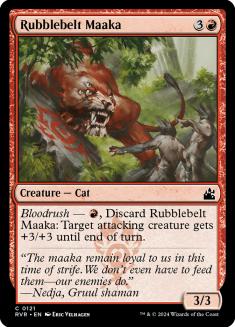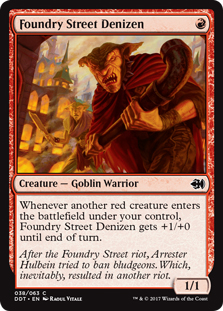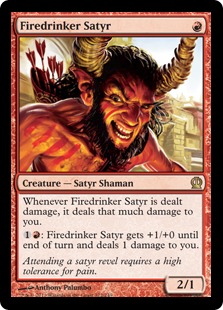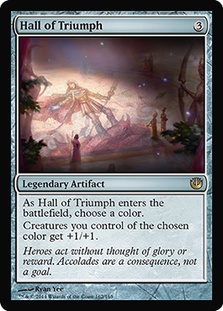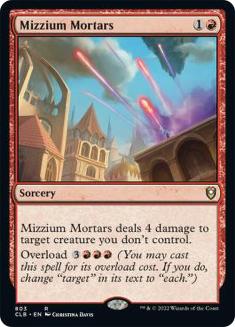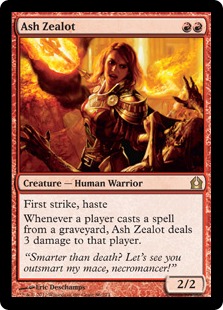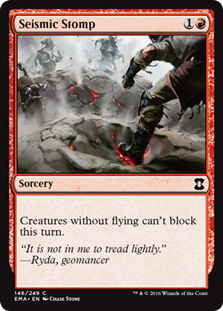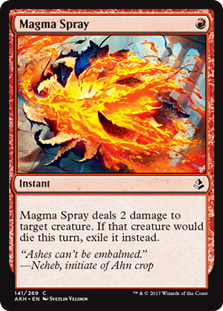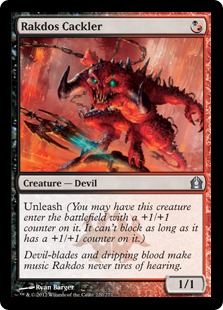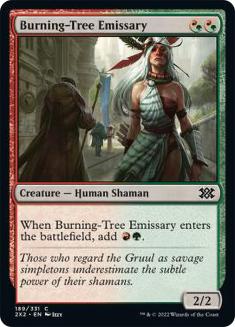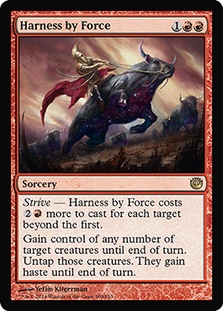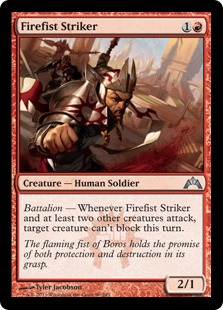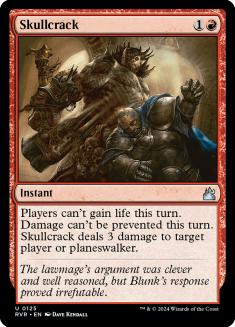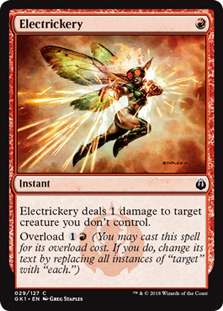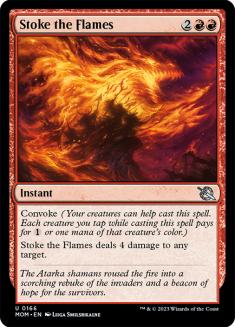Goblin Rabblemaster has been my pick for the best card to come out of M15. I’ve been developing red decks with Goblin Rabblemaster and have found the best
shell for it to be Mono-Red with plenty of one-drops, with a few more lands than Boss Sligh to accommodate the higher curve.
Although I wasn’t qualified for Pro Tour Magic 2015, I was in contact with Brad Nelson and gave him a Goblin Rabblemaster deck that I’d been working on. He
had already wanted to play a fast red deck to get underneath the expected field of B/W Midrange and other controlling decks that Pro Tours are usually full
of and we both expected less Mono-Blue Devotion to be running around.
It wasn’t long before he was whooping up on his teammates on Team Revolution. It took a while but eventually they gave the deck its due credit. Nine of the
ten members of the team ended up running it with the best finish being Jeremy Dezani coming in a heartbreaking 9th place on tiebreakers. I gave them the
following list, which is very close to what I played at the Open Series in Dallas this past weekend. They ended up tweaking the list to fit their
preferences, but I still like how the deck feels and plays out. The following is an amended introduction and sideboarding primer of what I sent Brad Nelson
and Team Revolution for PT Magic 2015 and is the version of Rabble Red that I personally feel most comfortable with.
Let’s begin:
You’re playing this deck to take advantage of a field heavy in Mono-Black Devotion and slow decks with the temples. You’re an aggressive deck that doesn’t
take damage from its own lands which makes other aggressive matchups pretty good.
Goblin Rabblemaster and Stoke the Flames are the big additions from M15. Stoke the Flames provides the reach needed against decks that stabilize with a
sweeper. Mizzium Mortars was important before to kill Courser of Kruphix, Blood Baron of Viskopa, Frostburn Weird, Brimaz, King of Oreskos, and Gray
Merchant of Asphodel. Now Stoke the Flames does double-duty to remove four toughness creatures and to finish off players.
Creatures (31)
- 3 Ash Zealot
- 4 Rakdos Cackler
- 4 Burning-Tree Emissary
- 3 Legion Loyalist
- 2 Firefist Striker
- 4 Foundry Street Denizen
- 3 Rubblebelt Maaka
- 4 Firedrinker Satyr
- 4 Goblin Rabblemaster
Lands (21)
Spells (8)

Goblin Rabblemaster forces goblins to attack, which makes your attacks less suspicious than before. Rubblebelt Maaka tends to punish them for blocking even
more than before as they are no longer deciding whether to call a possible pure bluff.
Note how Stoke the Flames can be used to prevent your creatures from attacking. Sometimes when you play Goblin Rabblemaster, the 1/1 goblin will chump
attack. Tapping the Goblin Rabblemaster and the token it makes in combat will save the token for a really strong attack next turn.
EIdolon of the Great Revel is a card that would be fine game 1 against many decks but is detrimental in enough matchups that it’s best left in the
sideboard. Opponents have to respect the speed of your deck and will reduce the overall converted mana costs of their spells to keep up, increasing the
potency of Eidolon of the Great Revel after sideboard.
Eighteen Mountains and three Mutavaults is enough land for the deck when you’re playing first. While sideboarding there are a few reasons to side out a
land. When drawing first you can afford to play about a half-land less. Matchups that are very attrition heavy, like against R/W Burn, the player with the
last creature in play tends to win, so taking out a land there is recommended. Lastly, against Thoughtseize decks you want a critical mass of redundant
threats so you side out a half-land in that situation.
Mountain = 1 land
Mutavault = ½ a land
Each matchup has a link attached so click it to see a reference decklist.
Versus Mono-Black Devotion
How you sideboard is dependent on if they’re playing Nightveil Specter or Lifebane Zombie. Lifebane Zombie is a joke and gets run over by Legion Loyalist.
If they have Nightveil Specter then you want to keep in the Lightning Strikes. If they have Lifebane Zombie, be sure to play Burning-Tree Emissary before
they reach three mana to cast Lifebane Zombie. This might mean running it out bare instead of playing a more efficient Ash Zealot on turn 2.
The deck is very resilient to Thoughtseize. Some people believe they are good enough to keep in while others sideboard them out. If they keep them in, you
want to keep a high density of spells so you’ll be sideboarding out a land to keep up. Keeping a one-land hand with many two-power creatures that cost one
mana is perfectly fine, especially on the draw.
The easiest way to lose this matchup is to let them get a two-for-one with Bile Blight. This may mean not playing the second Burning-Tree Emissary or
Rakdos Cackler until you either draw out Bile Blight or put them into a situation where you’re sure they would have used it if they had one.
There may be a temptation to bring in Skullcrack to stop the life from Gray Merchant of Asphodel. You’re better off either presenting a threat or removing
one of theirs.
Out (on the play if they have Lifebane Zombie):
In (on the play if they have Lifebane Zombie):
Out (on the draw against Lifebane Zombie):
In (on the draw against Lifebane Zombie):
Out (on the play against Nightveil Specter):
In (on the play against Nightveil Specter):
Out (on the draw against Nightveil Specter):
In (on the draw against Nightveil Specter):
Versus B/G Devotion
Because they have Golgari Charm and Abrupt Decay you can expect them to have less Drown in Sorrow, Bile Blight, and likely no copies of Pharika’s Cure. We
sideboard out some of the one-toughness creatures and bring in the second Hall of Triumph to reduce the impact of Golgari Charm.
Out (on the play):
In (on the play):
Out (on the draw):
In (on the draw):
Versus B/W Midrange
This matchup is typically better than Mono-Black Devotion because they have a slower and more painful manabase. They use Banishing Light as a removal spell
to hit everything and it’s too slow against us. They have more expensive cards like Elspeth, Sun’s Champion, Blood Baron of Vizkopa, and Obzedat, Ghost
Council. They often have a Whip of Erebos too which is often too slow to matter. Most, if not all B/W Midrange players prefer Lifebane Zombie over
Nightveil Specter, allowing Lightning Strikes to be sideboarded out. Be careful not to run a Rakdos Cackler into a Blood Baron of Vizkopa since the Cackler
is a black creature.
Out (on the play):
In (on the play):
Out (on the play):
In (on the draw):
Versus Mono-Blue Devotion
This matchup looks bad on paper, and it is assumed it’s good matchup against Boss Sligh and other Mono-Red decks. That’s part of the reason for its recent
resurgence in popularity. The key to winning the matchup is to contain their payoff cards, which are Thassa, God of the Sea and Master of Waves. If we keep
Thassa inactive and the number of tokens created by Master of Waves to a minimum then the alpha strike with Legion Loyalist the turn after they cast Master
of Waves ought to be lethal.
Out (on the play):
In (on the play):
Out (on the draw):
In (on the draw):
Versus G/W Aggro
They play four copies of Mana Confluence which deals them a significant amount of damage. Where they had Unflinching Courage before they now have Ajani
Steadfast, which is slower and easier to deal with. Their removal is Banishing Light which matchups up poorly with our cheap threats. Keep Advent of the
Wurm and Selesnya Charm in mind when making attacks. Their token creatures can’t block through Legion Loyalist’s battalion so on turn 4 when they leave up
mana for Advent, that’s the perfect time to punish them. They have Soldier of the Pantheon that matches up well against our multicolored creatures so you
want to side some number of those out. Be careful not to walk into the exile function of Selesnya Charm. This may mean allowing a trade when you could save
your creature with Rubblebelt Maaka or by not attacking into an empty board with Goblin Rabblemaster. Try to save Magma Spray to exile Voice of Resurgence.
Out (on the play):
In (on the play):
Out (on the draw):
In (on the draw):
Versus R/W Burn
Your worst matchup. Firedrinker Satyr is terrible to get hit by a Searing Blood. If they have Young Pyromancer, you want the copy of Electrickery. There’s
no way for them to be left with any Elemental tokens if you overload it. If they have Satyr Firedancer, then you have to play more burn spells to deal with
those, as it will outright beat you. The games go long and it comes down to who has the last threat in play, which is sometimes Rubblebelt Maaka. Try to
save Magma Spray to exile Chandra’s Phoenix, even if they activate Mutavault to block and trade.
Out (on the play):
In (on the play):
Out (on the draw):
In (on the draw):
Versus Jund Monsters
Three-color decks are what this deck is designed to punish. They are prone to stumbling on their curve with their temples. While Eidolon of the Great Revel
doesn’t hit a significant number of cards from their deck in game 1, they have to lower their curve to keep up with your speed increasing the number of
cards that get hit my Eidolon. They rarely run Bile Blight, Anger of the Gods, or Drown in Sorrow so the cards you play around will be Golgari Charm and
Mizzium Mortars. Lightning Strike isn’t great, but it is good to have against their Scavenging Oozes or possibly Nylea’s Disciples.
Out (on the play):
In (on the play):
Out (on the draw):
In (on the draw):
Versus Jund Planeswalkers
A new contender straight out of the Open Series in Kansas City, Jund Planewalkers does some powerful things but is even slower than its Monsters cousin.
Garruk, Apex Predator, Vraska the Unseen, and Liliana Vess are too slow to be effective. Xenagos, the Reveler makes tokens that can be circumvented by
Legion Loyalist. They have no cards like Polukranos, World Eater or Stormbreath Dragon to put pressure on you. As long as you don’t get caught by a Golgari
Charm or an overloaded Mizzium Mortars, you should run them over just fine.
Out (on the play):
In (on the play):
Out (on the draw):
In (on the draw):
Versus U/W Control and Esper Control
Esper is typically easier to beat than U/W as they have more temples and shocklands. Azorius Charm is annoying but can be punished by an Eidolon of the
Great Revel in your first main phase. The second Hall of Triumph comes in to not overextend into Supreme Verdict and to turn off their Last Breaths, as
well as to better pressure their Jace, Architect of Thought. Firefist Striker is pretty weak and Lightning Strike generally doesn’t have any creature
targets other than Mutavault. Skullcrack stops the lifegain from Elixir of Immortality and Sphinx’s Revelation. Legion Loyalist does a good job getting
through tokens from Elspeth, Sun’s Champion.
Out (on the play):
In (on the play):
Out (on the draw):
In (on the draw):
Versus Mono-Green Devotion
Of all the devotion decks, this one is the most explosive. Their draws that start on Elvish Mystic then go to Burning-Tree Emissary(s) into Sylvan Caryatid
will be too much for even our fastest draws. The good news is that after sideboard they need to reduce their number of real threats to bring in cheaper
cards making them prone to flooding out. If they have Nylea’s Disciple, lean towards keeping in Lightning Strike and taking out a one-toughness creature to
reduce the impact of Golgari Charm. If they pass with mana up, think about what they can appropriately Chord of Calling for (Hornet’s Nest is a target
post-sideboard) and that they could be leaving up Setessan Tactics.
Out (on the play):
In (on the play):
Out (on the draw):
In (on the draw):
Versus Boss Sligh
Rabble Red is exactly the kind of deck that Boss Sligh doesn’t want to see: a deck that it can’t go underneath and has stronger cards and cheap removal.
This matchup is about stranding their situational pumps spells by killing all their creatures. You play the match defensively, which will often include
casting Rakdos Cackler without the unleash and leaving back Ash Zealot on defense.
Out (on the play):
In (on the play):
Out (on the draw):
In (on the draw):
Versus White Weenie variants
Skullcrack notably turns off the damage prevention part from protection. This means that Solider of the Pantheon will trade with a multicolored creature
and that your red creatures will damage to their creatures when they block and cast Brave the Elements. There is also enough lifegain from Ajani Steadfast
and Fiendslayer Paladin after sideboard to sometimes prevent lifegain.
Out (on the play):
In (on the play):
Out (on the draw):
In (on the draw):
Versus Junk Midrange
Of the three-color decks in Standard, this is the one that will give you the most trouble. They have the right mix of acceleration, life gain, card
advantage, and removal to compete. If they draw it all in the right order then it’s tough. Fortunately like other three-color decks, they are prone to
stumbling or taking too much damage from their own lands. Junk builds come with a wide variety of cards to play around so often it’s best to throw caution
to the wind and jam your cards and hope for the best.
Out (on the play):
In (on the play):
Out (on the draw):
In (on the draw):
Versus Naya Hexproof
You can’t interact with their creatures, but they do a ton of damage to themselves with Mana Confluence and shocklands. Their best bet is to one-shot you
with Ghor-Clan Rampager and a double strike effect like Ajani, Caller of the Pride or Boros Charm. Your goal here is to put up enough pressure on them
where they have to leave their hexproof creature with Ethereal Armor on it on defense. This is a matchup where a Rakdos Cackler sometimes comes down
leashed to chump-block.
Out (on the play):
In (on the play):
Out (on the draw):
In (on the draw):
Versus Mono-Red Devotion
Boros Reckoner is a problem but can be overcome. Firedrinker Satyr gets hit hard by a Mizzium Mortars and sometimes they come with Anger of the Gods after
sideboard. Here we do our best to contain their devotion by removing their creatures. If they have Chandra’s Phoenix, you also want to sideboard in Magma
Spray.
Out (on the play):
In (on the play):
Out (on the draw):
In (on the draw):
Versus Naya Aggro
This matchup comes down to being a very quick race. They have four Soldier of the Pantheon and four Brave the Elements to give your Skullcracks good things
to turn off. Their manabase hurts themselves more than any other deck in the format so a few quick hits along with burn will finish them off. When they hit
four mana, be wary not to lose to Ghor-Clan Rampager + Boros Charm.
Out (on the play):
In (on the play):
Out (on the draw):
In (on the draw):

